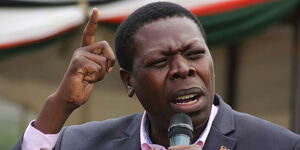Parliament on Wednesday night passed several taxes that include increasing an import tax, known as the railway development fund, to 2 per cent from 1.5 per cent.
The railway development fund passed last night is part of the laws contained in Tax Laws (Amendment) Bill 2024 and has been contentious, with a majority of Kenyans saying that the move will lead to the cost of imported goods going up.
However, the government has claimed that the new levy will facilitate the maintenance and development of rail including the Standard Gauge Railway (SGR).
In the late-night vote, Members of Parliament endorsed the repeal of the Digital Services Tax, which has been in place since January 1, 2021, at a rate of 1.5 per cent of the gross transaction value.
MPs gave a nod to a Significant Economic Presence Tax at a rate of 30.0 per cent on taxable profit, which is deemed to be 10.0 per cent of the gross turnover of a non-resident person providing services through a digital marketplace.
The goal of the tax, which was part of the raft proposals in the rejected Finance Bill 2023, is to broaden the tax base to include a wider range of digital economic activities, such as online advertising, data usage, and e-commerce transactions.
Another key amendment that passed through Parliament is the lowering of the investment deduction at the 100 per cent threshold from Ksh3 billion to Ksh1 billion for investment outside Nairobi.
What this means is that people seeking investors can claim a 100 per cent deduction of the capital expenditure in the year of investment. This is money investors use to spend to invest in machinery, buildings, and the like used in manufacturing.
The government hopes to reduce the upfront cost of capital-intensive projects, fostering growth and job creation.
Parliament also agreed to a minimum top-up tax for multinational companies whose effective tax rate is currently less than 15 per cent. A so-called significant economic presence tax for foreign firms carrying business over digital marketplaces was also passed.
Lawmakers, however, decided against the imposition of a 10 per cent levy on infrastructure bonds that are currently tax-free. A proposal to increase taxes on telephone and Internet data services to 20 per cent from 15 per cent was also rejected.
MPs backed the scrapping of a proposal to introduce a tax of 5 per cent on the interest earned from a bond, note, or other similar security.
The Parliamentary Committee had argued, “The proposal will discourage investment in these bonds and hamper the momentum of developing the market as it makes Kenyan bonds less attractive.” MPs agreed with the Committee.
“A continuous increase in the rate of tax does not necessarily lead to an increase in tax collection,” stated Kuria Kimani, the chairman of the National Assembly’s finance committee.












